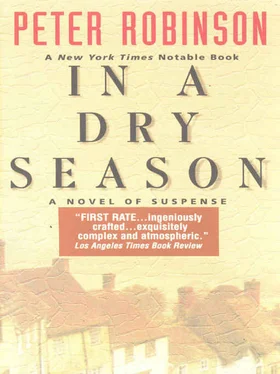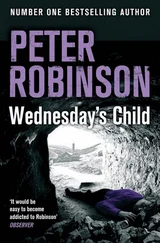“No. See you, then.”
And with that she opened the car door and got in. Banks ignored his cutting-down program and lit another cigarette, aware that his hands were shaking. Without looking back, Annie started her car. Banks watched the red taillights disappear down the muddy track.
After a long, rainy winter and overdue repairs by Yorkshire Water, Thornfield Reservoir filled up again and Hobb’s End once more disappeared. On July 27 of the year after the Gloria Shackleton murder had entered and left the public’s imagination, Vivian Elmsley lay on a king-size bed in her Florida hotel room, propped up with pillows, and watched the local news channel.
Vivian was in the midst of a national book tour, seventeen cities, and while Gainesville wasn’t on the itinerary, she had enough clout with her publishers for this brief diversion. She would have come anyway, tour or no tour. Yesterday she had been in Baltimore, Bethesda and Washington, D.C., tomorrow she was going to Dallas, but tonight she was in Gainesville.
For tonight was the night that Edgar Konig had his appointment with Old Sparky, and after everything she had been through, Vivian desperately needed some sense of an ending.
It was a sultry, mosquito-ridden night, but that didn’t seem to deter the crowds that gathered outside the gates of Starke Prison, about twenty-five miles away. One or two were quietly carrying placards that asked for an end to capital punishment, but by far the majority were chanting, “Fry Konig! Fry Konig!” Bumper stickers echoed the same sentiments, and the crowd had created what the commentator called a tailgate-party atmosphere. It wasn’t big enough to attract any of the national networks – after all, executions in Florida were as common as muggings – but the Konig case had caught a lot of local interest.
Frank Stringer would have come, too – and Vivian would have willingly paid his way – but he was in jail. English gun laws are far stricter than they are in Florida. Besides, no matter how good his reasons for taking Vivian hostage at Thornfield the past September, he had committed a serious crime and occasioned a hugely expensive and highly publicized police operation. Vivian had visited him several times in jail and told him she would help him get back on his feet when he came out. It was the least she could do for Gloria’s memory.
In his turn, Frank had told her how his father’s sister Ivy and her husband John had taken good care of him during the war and how he had thought of them as his parents. When his real father came home on leave, they would spend time together. That was when they had made the first journey north, in 1943, and he had seen his mother.
After the war, his father married and took him away from Ivy and John. Frank’s stepmother turned out to be a drunk and a shrew who had no time for her husband’s bastard son. Increasingly isolated and neglected, he got involved with crooks and gangs, and one thing led to another. The only constant was that he had always worshiped his true mother’s memory.
Frank also told Vivian how the death of his father that spring and the reemergence of Hobb’s End from Thornfield Reservoir had caused his obsession with the past to escalate. His father had been the first to recognize Gwen Shackleton as Vivian Elmsley on television, but Frank had confirmed it; he had memorized her eyes and her voice all those years ago, when he was eight, the same way he had also memorized his mother’s face.
He couldn’t explain why he had taken the trouble to find out where Vivian lived and why he had followed her and approached her at the bookshop; it was just that she was the only one left, the only one who had known Gloria. He said that he meant no harm at first, that he might even have found the courage to approach her eventually.
Then the skeleton was discovered, and he knew she must have lied all those years ago. He hated her after that; he telephoned to scare her, to make her suffer. He could have taken her anytime, but he enjoyed the anticipation. After all, once he had confronted her, it would be all over. So he followed her, watched her. When she got the taxi outside her hotel, he knew where she was going, and he felt it was fitting that things should end there, where they began.
But tonight, Vivian was alone in Gainesville with her memories, the television, a bottle of gin, ice and tonic water. And an execution.
They had already shown a fairly recent photograph of Edgar Konig. Vivian hadn’t been able to recognize the gangly, baby-faced young airman with the shy eyes and the blond brush cut. His hair was gone, his cheeks had sagged and wrinkled, his brow was creased, and his eyes were deep, dark pits in which slimy monsters squirmed.
As she watched the coverage, Vivian imagined the officials carrying out the preliminary steps of state-sanctioned murder with swift and impersonal efficiency, much like dentists or doctors.
First they would settle the patient in the heavy oak chair and buckle thick leather straps around his arms and legs. Then they would place the bit between his teeth and attach electrodes to his body as if they were carrying out an EKG.
She wondered if the leather straps smelled, if they were sour with the sweat and fear of previous victims. How many hands and legs had they strapped down before? Or were they replaced after every execution? What about the chair itself? How many bladders and bowels had emptied there?
Then they would clamp the metal skullcap on.
Vivian shook her head to clear the images. She felt dizzy, and she realized she was already a bit drunk. If anyone deserved this sort of end, she told herself, ambivalent as she was about the idea of capital punishment, it was probably Edgar Konig.
Vivian had been shocked when Banks told her the day after Frank’s arrest that Gloria’s murderer was not dead, but on death row in a Florida prison.
Did he think of Gloria now, Vivian wondered, now the end was so close? Did he spare a thought for a beautiful young woman all those years ago in a village that no longer existed, in a war long since won? And what about the others? How many had there been? Even Banks hadn’t been able to give her a definite number. Did he think about them?
If he was like most such killers she had read about in the course of her research, he probably felt nothing but self-pity and spent his last moments cursing the bad luck that resulted in his capture. What Banks had told her a few days after the scene at Hobb’s End did nothing to dispel that idea.
Banks’s FBI contact had interviewed Konig last December and sent in a report. Konig said he remembered the first one he did was in England during the war. He couldn’t remember her name or the circumstances, but he thought maybe she was a blonde. He did remember that he had been giving her stockings and gum and cigarettes and bourbon for more than a year and when he came to collect she didn’t show a scrap of gratitude. He’d been drinking. He remembered the way the pressure had been building and building in him all that time until he’d had too much that night and the dam finally burst. She wouldn’t have anything to do with him , a lowly PX grunt. Oh, no. She was fucking a pilot .
It was always the drink, he said. If it hadn’t been for the drink he would never have done any of them. But booze made something deep inside him just snap, and the next thing he knew, they were dead at his feet. Then he was angry at them for dying and he used the knife. It was like that with the second one. Berlin, 1946. When he didn’t get found out the first time, when he realized there wasn’t even going to be an investigation, he thought he must be leading a charmed life.
It was all her fault. If she hadn’t stopped to straighten her stockings as he was driving by, hiking her skirt up and showing those long, white legs in his headlights, then he would never have done her. If he hadn’t been drunk, too, which he wouldn’t normally have been while driving if he hadn’t known the lonely road like the back of his hand. If. If. If . His life was a tragedy of cruel ifs .
Читать дальше












